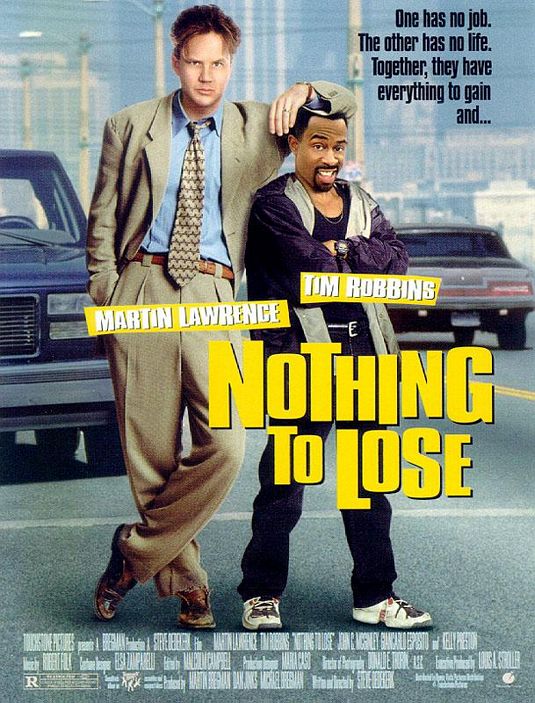 What could possibly be said to express how good this movie is? It will make you love Martin Lawrence. Yep, that's probably it. It's not likely that Nothing to Lose will make any other lists of top comedies. Describing this movie without making it seem like the generic buddy comedy meets caper flick that it may have actually become requires suspension of most critical faculties. After all, it is a movie best described by taking one genre and having it "meet" another. Still, you don't have to choose to like it the way you would, say, a Harry Potter movie. It almost dares you to dismiss it, and then it dazzles you with a humor free of cynicism that is impossible to resist.
What could possibly be said to express how good this movie is? It will make you love Martin Lawrence. Yep, that's probably it. It's not likely that Nothing to Lose will make any other lists of top comedies. Describing this movie without making it seem like the generic buddy comedy meets caper flick that it may have actually become requires suspension of most critical faculties. After all, it is a movie best described by taking one genre and having it "meet" another. Still, you don't have to choose to like it the way you would, say, a Harry Potter movie. It almost dares you to dismiss it, and then it dazzles you with a humor free of cynicism that is impossible to resist.
The ad campaign for this movie was either horribly mismanaged or keenly inspired. It thoroughly misleads you as to what the movie is actually about. Nick Beam (played by Tim Robbins) has a breakdown because he observes his wife cheating on him. Everyone who saw the previews knew this. So when, in the opening scene, he and his wife play sort of update of the staring game, where each tries to get the other to react by saying outrageous things, and she describes her extra-marital escapades, we read irony all over what is going on. She really is having and affair! Yet (spoiler alert), after Nick completely looses his mind and robs his boss, who he believes is this object of his wife's elicit attentions, we find out that it was all an improbable mistake involving a twin he had never met: "but you said your sister was coming to visit next week!" It wasn't her he saw in flagrante delicto after all. The sincere affection expressed at the end of that first scene was, when we think she is lying (by telling the truth, just watch the scene), heartbreaking. Marital bliss radiates from the screen in that scene. And we know it is all false. But in the end, we find out that it was sincere after all. Something that could not have happened, had we known too much about what to expect.
The irony in the first scene was not that she was truthful when she describes her affairs in a way that she knows her husband will not appreciate. The irony is that we thought we were in on what was coming up next in the movie, completely sold on the cheating wife story told in the preview. Nick was supposed to be misunderstanding what was happening when it was really us. The end result is a surprise (unless you've read this) that heightens the humor, and the suspense, at a key moment later in the movie.
The typical experience watching Nothing to Lose involves an overly enthusiastic and implausible recommendation from someone who has seen it, and a reluctant but eventually grateful consent. If you have seen it, you loved it, and naturally you want to everyone else to love it too. It is like the first time you are able to go on a drive, with friends, without a chaperone. It is an utterly common experience that would, based solely on a description of what happened, not merit the joy it caused. But it was joyful, in a way that things can be only when you are young.
And naive joyfulness isn't the only earnest quality of the movie. Martin Lawrence's character Terence appears, at first, to be just a stereotype. An "urban" petty criminal who finds it too easy to turn to theft in order to solve his problems. But he isn't as ignorant as we assume at first, and when he displays a technical proficiency with Nick's camera, we conclude too easily that he is just too "lazy" to use his knowledge to find legitimate work. Then, in rejection letters that only exist in movies which are neatly placed just where Nick will find them, we find that he is really trying to find a better way. So, what do we do with that understanding? We realize that we judged him just because it was easier than confronting what it would mean if he wasn't actually the cause of all his problems.
At the end of the movie, Nick has a chance to "get his life back." The comfortable, blissful world he thought was shattered is possible for him again. And, although the social issues in the movie probably started as a simple plot device to keep the action moving, it is genuinely moving when Terence tells him, "you forget, I get my life back too." This movie came out thirteen years ago, but some of the biggest social issues we face right now were beautifully summed up in that moment.
There is so much more to say about how funny this movie is. Endlessly quotable, sexy, foolishly brilliant. The disco dancing security guard. Nevertheless, you just can't do it justice in a blog.
You should do a Top 5 of blogposts you shouldn't write. #1 - All!
ReplyDeleteI suppose you have a point. I mean, I'll never be as cool as someone who goes on to random blogs and insults people anonymously.
Delete